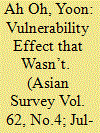| Srl | Item |
| 1 |
ID:
190039


|
|
|
|
|
| Summary/Abstract |
In 2022, Ferdinand Marcos Jr., the son and namesake of the late dictator, won a landslide victory in the presidential election after campaigning largely on nostalgia for the Philippines’ authoritarian past and perceived former greatness. The country was finally able to reopen from COVID-19 lockdowns after enduring a surge in the Omicron variant in the earlier months of the year. Global food and energy inflation, caused by excessive fiscal spending and monetary easing adopted during the pandemic, in addition to the aftershock of Russia’s invasion of Ukraine, has led to an unprecedented food crisis in the Philippines that has been particularly difficult for the poor. In terms of foreign policy, Marcos Jr.’s arrival marked a return to more conventional diplomatic interactions with Washington at a time of increasing tension between the United States and China.
|
|
|
|
|
|
|
|
|
|
|
|
|
|
|
|
| 2 |
ID:
186409


|
|
|
|
|
| Summary/Abstract |
In response to the outbreak of a new viral infection in the early weeks of 2020, some countries imposed strict entry restrictions on visitors from China, while others opted for less stringent measures. Among the explanations for such variation, this study is focused on the argument that a country’s economic dependence on China, particularly via trade, affected its decision. This economic vulnerability argument posits that countries highly dependent on China for trade avoided imposing a ban because it might have caused (1) primary economic losses from trade disruptions and (2) secondary economic losses from Chinese sanctions. I empirically test this argument using an original data set on entry restrictions on China. The findings do not support such a hypothesis. Using the nonconforming cases of Japan and South Korea, I speculate that country-specific factors, which tend to be idiosyncratic and political, may have played a role.
|
|
|
|
|
|
|
|
|
|
|
|
|
|
|
|